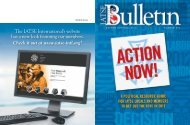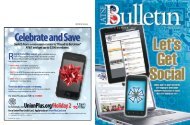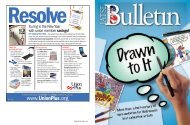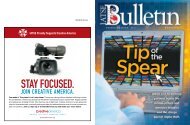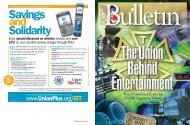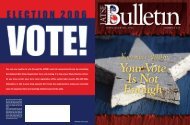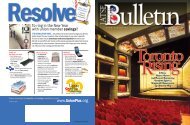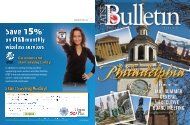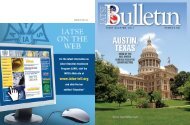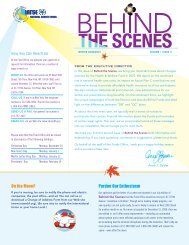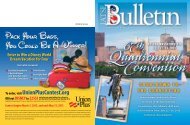Second Quarter 2011 - IATSE Local 8 Philadelphia
Second Quarter 2011 - IATSE Local 8 Philadelphia
Second Quarter 2011 - IATSE Local 8 Philadelphia
You also want an ePaper? Increase the reach of your titles
YUMPU automatically turns print PDFs into web optimized ePapers that Google loves.
THealthToday’s world is getting more andmore complicated every day. Therewas a time in this business when it wasenough just to go to work, do your job,and go home. If you were responsiblewith your money you would be okay.You didn’t really have to think aboutyour pension or your health insurance.If you got sick you went to the doctor,they treated you and that was that. Filingall the insurance papers was inconvenient,but not that bad.Well, those days are gone. Wedon’t even say health insuranceanymore – we say health care planor HMO, PPO, POS or some othergroup in initials! We don’t go to thedoctor anymore – we visit our healthcare provider. In-Network, Out-of-Network, Gate Keeper, Primary CarePhysician, Specialty, PA, NP, UrgentCare, Emergency Room, Lab, ImagingCenter, Formulary – it’s a mess! Butit’s a mess we have to deal with.Members of the <strong>IATSE</strong> in the U.S.participate in many different healthcare plans depending on what <strong>Local</strong>they belong to and what type of workthey do. Two of the larger ones arethe Motion Picture Industry Pension &Health Plans and the <strong>IATSE</strong> NationalBenefit Funds. Both plans service many<strong>Local</strong>s. Other local unions have theirown plans. One thing that most of thehealth plans in the IA have in commonis that they are Taft Hartley Plans. Thatmeans that a trust fund has been set upthat the employers contribute to that islegally distinct from the union and theemployers. That fund is managed bya Board of Trustees equally representativeof management and labor. Themoney contributed to the Fund by theCare Plans and Youemployers is for the sole and exclusivebenefit of the participants and theircovered dependents. The whole thinggets very complicated. The main pointhere, is that the trust fund is a completelyseparate entity from the unionor the company. It is controlled by theTrustees who act independently fromthe union or the company. The Trustees,union and management togethercontrol the fund. It is a difficult, complicatedand stressful job, and to top itoff, they don’t get paid for it.So why do they do it? Managementtrustees do it largely because their companiesassign them to it. Union trusteesdo it out of a sense of duty anda real desire to make things better forthe member and their families. Trusteeson heath care funds today have a verydifficult task indeed. Health care costsare going up every year, rising muchfaster than contributions. One solutionis to bargain increases to the funds inour contracts. One recently negotiatedagreement saw a 60% increase in thehealth care contribution. But it is notenough. Trustees around the countryare faced with the same problem, --what do they do? Many plans have undergoneextensive “plan design changes,”but it’s still not enough! Eligibilityrequirements have been increased. Nobodylikes to do it, but it has to bedone. And it’s still not enough. Costscontinue to rise and plan reserves continueto fall. Many plans have resortedto co-pays for premiums, (money thatthe participant pays to the trust to maintaincoverage). All these changes andthe funds are barely staying even. Yes,the Trustees have quite a job on theirhands, and they need your help.First, learn your plan! Take thetime to find out what the eligibility requirementsare and keep track of yourhours or earnings. Don’t get caughtshort. If you think you are about todrop out of coverage, contact theTrust and find out where you stand.<strong>Second</strong>, become a good health careconsumer; learn how your particularhealth care system works. Establish arelationship with your primary carephysician before a crisis occurs. Getregular check-ups and follow throughwith any recommendations. Not onlydoes it make good medical sense, butin the event of an emergency, you willalready be familiar with your systemand how to navigate through it.Third, check all your paperworkfrom any health care transaction and ifyou have questions, ask. If you don’t getany resolution to your problem, contactthe Trust and see if they can help.Next, stay In-Network if you can.Make sure that any services your doctorprescribes for you are in your network.Your doctor may not know, soyou should always check before youreceive treatment. After all you will beresponsible for the bill.Lastly, learn as much as you canabout your trust and your health caresystem before you need to use it. Getthe Summary Plan Description (SPD)that the trust sent you. If you can’t findit, ask them for another one. Read it andask questions. The more you know theeasier accessing health care will be.If you want to find out more aboutTaft Hartley Trust Funds, check outthe National Labor College Websiteat http://www.nlc.edu/cait/olc/Taft_Hartley/html/t-chpater%201.html.AuthorizationFor Representation CardSooner or later, if you find yourself on a job not covered by a collective bargainingagreement, you will probably meet organizers from the International.Generally speaking, the International sends one or more organizers to assistlocal BA’s in organizing non-union work in their jurisdiction.Among the first things that happens is that the union must establish that itrepresents a majority of the bargaining unit. And while there are a number ofways to demonstrate that fact, almost all begin with the signing of an authorizationfor representation card.These cards are presented to employees by the union. The card authorizesthe union to act as an employee’s collective bargaining agent. The card is strictlyconfidential and will not be shown to the employer, though it may be confidentiallyviewed by a neutral third party in the event the employer demands a cardcount. The cards are also subject to review by the NLRB, but again cannot bedisclosed to the employer.Simply being a member of the <strong>IATSE</strong> does not necessarily mean that youhave already pre-designated the IA as collective bargaining agent with a givenemployer (this will vary from Province to Province in Canada). Organizers willalways seek to get “fresh” cards, both to assure that the letter of the law is metand also to get an indication of the resolve of the crew to stand up and obtaina contract.The following is a typical authorization card. Look it over to familiarizeyourself with it. And remember, call in your work.DealMemosAll I.A.T.S.E. contracts allowour members to negotiate forwages and conditions that arebetter than those in the contract.Also, many of our members receive“kit” or “box” rentals fees.These agreements between theemployee and employer are oftencontained in deal memoswhich are signed by the employeeand the employer.Periodically, we hear frommembers that the deal memopresented by the employer containsadditional language. Recentexamples include askingthe employee to submit to drugtesting or background checks. Ifyou receive a deal memo froman employer that looks out ofthe ordinary or asks you towaive any part of the contract orasks you to submit to additionalemployment conditions suchas drug testing or backgroundchecks, contact your BusinessRepresentative before you sign.The employer must talk to theUnion before asking our membersto sign such agreements.These issues are subject to collectivebargaining.20 O official Bulletin<strong>Second</strong> <strong>Quarter</strong> <strong>2011</strong> 21



